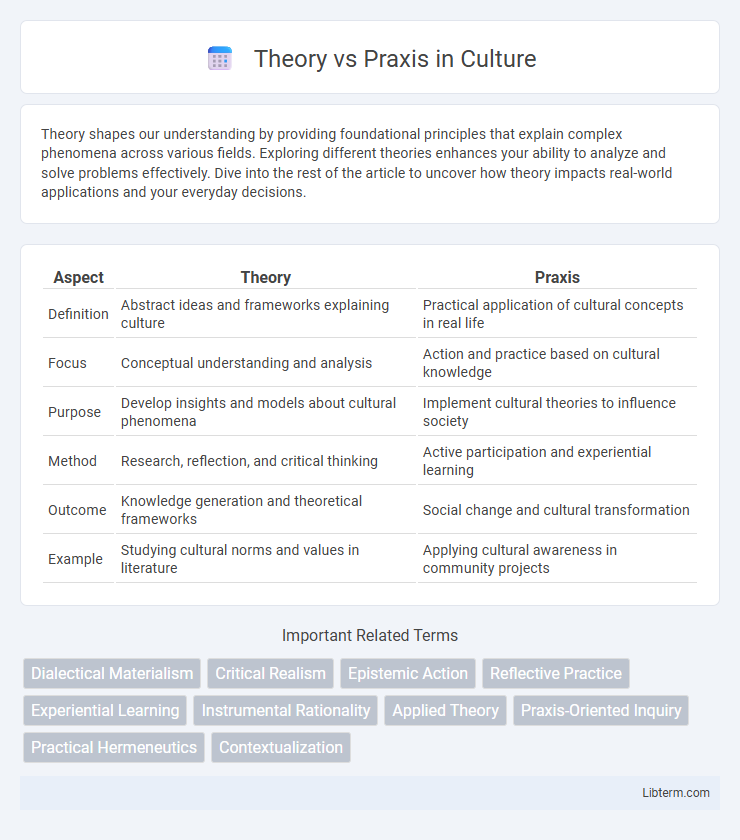Theory shapes our understanding by providing foundational principles that explain complex phenomena across various fields. Exploring different theories enhances your ability to analyze and solve problems effectively. Dive into the rest of the article to uncover how theory impacts real-world applications and your everyday decisions.
Table of Comparison
| Aspect | Theory | Praxis |
|---|---|---|
| Definition | Abstract ideas and frameworks explaining culture | Practical application of cultural concepts in real life |
| Focus | Conceptual understanding and analysis | Action and practice based on cultural knowledge |
| Purpose | Develop insights and models about cultural phenomena | Implement cultural theories to influence society |
| Method | Research, reflection, and critical thinking | Active participation and experiential learning |
| Outcome | Knowledge generation and theoretical frameworks | Social change and cultural transformation |
| Example | Studying cultural norms and values in literature | Applying cultural awareness in community projects |
Introduction to Theory vs Praxis
Theory provides a structured framework of concepts and principles that guide understanding, while praxis involves the practical application of these ideas in real-world contexts. The relationship between theory and praxis highlights the dynamic interaction where theoretical knowledge informs practice, and experiential insights refine theoretical models. Emphasizing this interplay is crucial for disciplines like education, social sciences, and philosophy to bridge the gap between abstract knowledge and effective action.
Defining Theory: Concepts and Significance
Theory constitutes a systematic framework of abstract concepts and principles designed to explain phenomena within various disciplines, providing a foundation for understanding complex realities. Its significance lies in guiding research, shaping methodologies, and predicting outcomes by offering coherent models that inform practical applications. By defining relationships between variables, theory enables practitioners to innovate and improve processes through informed decision-making.
Understanding Praxis: Application in Real Life
Praxis embodies the practical application of theoretical knowledge, transforming abstract concepts into actionable practices within real-life contexts. It bridges the gap between understanding and doing by enabling individuals to test, adapt, and refine theories through lived experience. This cyclical process of reflection and action is fundamental in disciplines such as education, social work, and philosophy, fostering meaningful change and deeper comprehension.
Historical Perspectives on Theory and Praxis
Historical perspectives on theory and praxis highlight the evolving relationship between abstract concepts and practical application, tracing back to ancient Greek philosophy with Plato emphasizing ideal forms and Aristotle advocating for empirical observation. During the Enlightenment, thinkers like Kant bridged theory and praxis by stressing reason as the basis for ethical action. Marxist theory further advanced this discourse by insisting that praxis--practical action--was essential to transform social realities, making the interplay between theory and praxis central to political and social change.
The Interplay Between Theory and Praxis
The interplay between theory and praxis shapes knowledge by linking abstract concepts with real-world application, ensuring ideas are tested and refined through practice. This dynamic relationship enhances problem-solving by allowing theory to guide action while praxis provides feedback that reshapes theoretical frameworks. Effective learning and innovation depend on the continuous cycle where praxis informs theory and theory informs praxis.
Common Misconceptions About Theory and Praxis
Common misconceptions about theory and praxis often confuse theory as purely abstract and irrelevant to real-world application, while praxis is mistakenly viewed solely as practical action without underlying conceptual framework. In reality, effective praxis relies on robust theoretical foundations to guide informed decision-making and problem-solving. Misinterpreting the dynamic interplay between theory and praxis can hinder progress in fields such as education, social activism, and organizational development.
Challenges in Bridging Theory and Praxis
Bridging theory and praxis presents challenges such as cognitive dissonance, where abstract concepts fail to align with real-world complexities, making practical application difficult. Inconsistent interpretations of theoretical models often lead to fragmented implementation strategies, reducing effectiveness in diverse contexts. Moreover, resource constraints and institutional resistance hinder translating theoretical insights into actionable practices, limiting innovation and scalable impact.
Case Studies: Successful Integration of Theory and Praxis
Case studies demonstrate the successful integration of theory and praxis by showcasing practical applications of theoretical frameworks in real-world scenarios, such as educational reform and healthcare innovation projects. These examples highlight how theoretical concepts guide decision-making and problem-solving while real-world feedback refines and adapts the theories for enhanced outcomes. The iterative process between theory and praxis fosters continuous improvement and evidence-based strategies across various fields.
The Role of Theory and Praxis in Modern Disciplines
Theory provides the conceptual frameworks and analytical tools essential for understanding complex phenomena across modern disciplines such as sociology, education, and engineering. Praxis transforms theoretical insights into practical applications through informed action, enabling disciplines to address real-world challenges effectively. The dynamic interplay between theory and praxis fosters continuous innovation, ensuring that knowledge remains relevant and adaptable in evolving professional contexts.
Future Directions: Evolving the Theory-Praxis Relationship
Emerging research emphasizes integrating adaptive feedback loops between theory and praxis to accelerate innovation and real-world application. Future directions prioritize co-creation frameworks where practitioners and theorists collaboratively redefine concepts in dynamic contexts, enhancing relevance and impact. Advancements in digital tools and data analytics facilitate continuous refinement of theoretical models through practical insights, driving an evolving symbiosis between knowledge generation and implementation.
Theory Infographic

 libterm.com
libterm.com